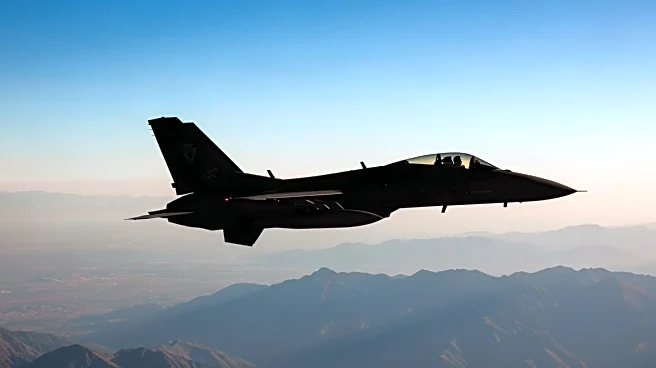What's Happening?
The United States Air Force has announced plans to host a Qatar Emiri Air Force training facility at Mountain Home Air Force Base in Idaho. This development was confirmed by Defense Secretary Pete Hegseth
during a meeting with Qatar's Minister of Defense, Saoud bin Abdulrahman al-Thani, at the Pentagon. The facility will accommodate Qatari F-15s and pilots, aiming to enhance combined training and increase lethality and interoperability between the two nations. The initiative has been in progress since 2017, during President Trump's first term, when Congress was notified of the intent to make a Foreign Military Sale to Qatar. An environmental assessment was conducted in 2022 at Mountain Home Air Force Base, which already hosts a Singaporean F-15 training facility established in 2009.
Why It's Important?
The establishment of the Qatar Emiri Air Force training facility in Idaho signifies a strengthening of military ties between the United States and Qatar. This collaboration is expected to enhance the operational capabilities and interoperability of both nations' air forces, contributing to regional security and stability. The facility is part of a broader strategy to host foreign military training programs on U.S. soil, which includes similar arrangements with other allies such as Singapore, Germany, and Italy. By hosting these facilities, the U.S. not only bolsters its defense partnerships but also benefits economically from the investments made by foreign governments in these training programs.
What's Next?
The next steps involve the construction and operational setup of the Qatar Emiri Air Force training facility at Mountain Home Air Force Base. Local and military officials are expected to continue discussions with Qatari representatives to finalize the details of the facility's operations and integration into existing base activities. The collaboration may lead to further joint military exercises and training programs, enhancing the strategic partnership between the U.S. and Qatar. Additionally, similar initiatives may be explored with other international allies, expanding the network of foreign military training facilities in the United States.
Beyond the Headlines
The decision to host foreign military facilities on U.S. soil raises questions about national security, sovereignty, and the implications of foreign military presence. While these facilities are funded by the respective foreign governments, the U.S. is responsible for their construction and security, which may lead to debates about resource allocation and strategic priorities. Furthermore, the presence of foreign military personnel may influence local communities, potentially leading to cultural exchanges and economic benefits, but also necessitating careful management of community relations and security protocols.








